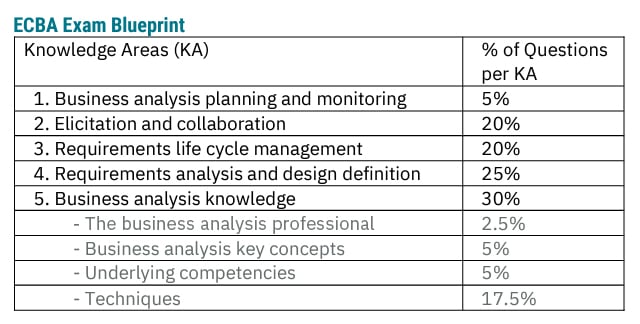Your ECBA Questions, Answered
Receive free IIBA updates and exclusive content!

The Entry Certificate in Business Analysis (ECBA) is the starting point for a rewarding career in business analysis. It proves you have the basic skills and knowledge to start working in the field and enabling organizational change.
Unlike more advanced certifications, the ECBA doesn’t require related work experience or professional development hours. That makes it ideal for those thinking about a career switch or looking to enhance their existing skill set.
Since the certificate teaches business analysis fundamentals and best practices, it’s a valuable addition to any toolkit. Regardless of job title, almost every professional can benefit from knowing the basics of business analysis to deliver better business outcomes.
Navigating the certification process can sometimes be tricky and time-consuming, so we’ve gathered the main points in one place. Here are some common questions (and answers) about the ECBA to prepare you for business analysis greatness.
What is the ECBA?
The ECBA is a globally recognized certificate offered by the International Institute of Business Analysis (IIBA). It's designed for individuals who are new to business analysis or have limited work experience in the field.Consider pursuing the certificate if you’ve:
- Started a career in business analysis
- Enrolled in a business program at school
- Graduated from college or university recently
- Considered switching careers
- Managed business analysts as a functional manager
Why Should I Pursue ECBA Certification?
The ECBA is your passport to an influential career in business. It offers numerous benefits, including enhanced credibility, increased earning potential, and better job opportunities.
These benefits only grow as you progress through IIBA’s certification program, adding the CCBA and CBAP to your name. In fact, according to the 2022 Global State of Business Analysis Report, certified professionals enjoy greater career satisfaction and a 15% bump in earnings compared to their non-certified peers.
Above all, the ECBA validates your fundamental knowledge of business analysis practices and demonstrates your commitment to professional development. If there’s a better reason to get certified, we haven’t found it.
What Are the Eligibility Requirements?
Earlier this year, we simplified the eligibility and processes for the certificate. The streamlined process reduces the steps required for candidates, making the certificate even more accessible. The requirements include:- Registering for an IIBA account
- Agreeing to the Code of Ethical Conduct and Professional Standards
- Agreeing to the Terms and Conditions
What’s the Exam Like?
The ECBA exam is a multiple-choice, knowledge-based test that evaluates your understanding of business analysis concepts and practices. It consists of 50 questions and lasts for one hour.
The questions are designed to assess your knowledge of fundamental business analysis principles. Here’s the exam breakdown:
Preparing for the ECBA exam requires a combination of study materials and practice exams. A Guide to the Business Analysis Body of Knowledge (BABOK Guide) is a primary resource. Study guides, online courses, and practice exams available from various sources are also critical to your success.
Is Classroom Training Necessary?
While not mandatory, classroom training can provide structured learning and the opportunity to interact with instructors and fellow candidates. That said, self-paced online courses and study materials are also effective options for exam preparation.
IIBA endorses education and training delivered by Endorsed Education Providers and Academic Program members to support the ongoing development of business analysis professionals. You can find an IIBA endorsed course or program by searching for “ECBA” within the Endorsed Education and Training Directory (filter by virtual or in-person formats).
Study groups are also provided by IIBA chapters.
What Happens if I Fail?
If you fail the ECBA exam, you can retake it. Waiting periods and associated fees apply, though, so it's best to prepare well before taking it again.How Long Is the ECBA Certificate Valid for?
Once you pass the ECBA exam and receive the certification, it doesn’t expire. This makes it a valuable investment in your professional development and your foundational business analysis knowledge.It’s also a great starting point for further career growth in the growing specializations of business analysis.
Now What?
With most of the basics out of the way, you can start your business analysis journey with confidence and peace of mind. Remember, dedication to learning and a commitment to excellence are key to your success on the road ahead!
Ready for the next step? Prepare for the ECBA exam like a pro with these six steps and take advantage of our end-of-year discount. For a limited time, IIBA members get a 20%* exam rebate on our entire suite of certifications when they write the exam by December 29, 2023.
If you’re not a member, purchase your membership first to be eligible. Hurry! This offer won’t be around for long.
Get started.
About the Author

Isabel Feher-Watters is the Manager, Certification Programs & Operations at IIBA and has over 25 years' experience working in the corporate, not-for-profit, association, and IT industries. Isabel complements her BA in Psychology and post-graduate diploma in Human Resources Management with several certifications including being a Certified Credentialing Professional (ICE-CCP), Certified Association Executive (CAE), Certified Training and Development Professional (CTDP), and ITIL certified. Isabel is passionate about human potential and delighted by the difference that certifications can make in the lives of business analysis professionals.



